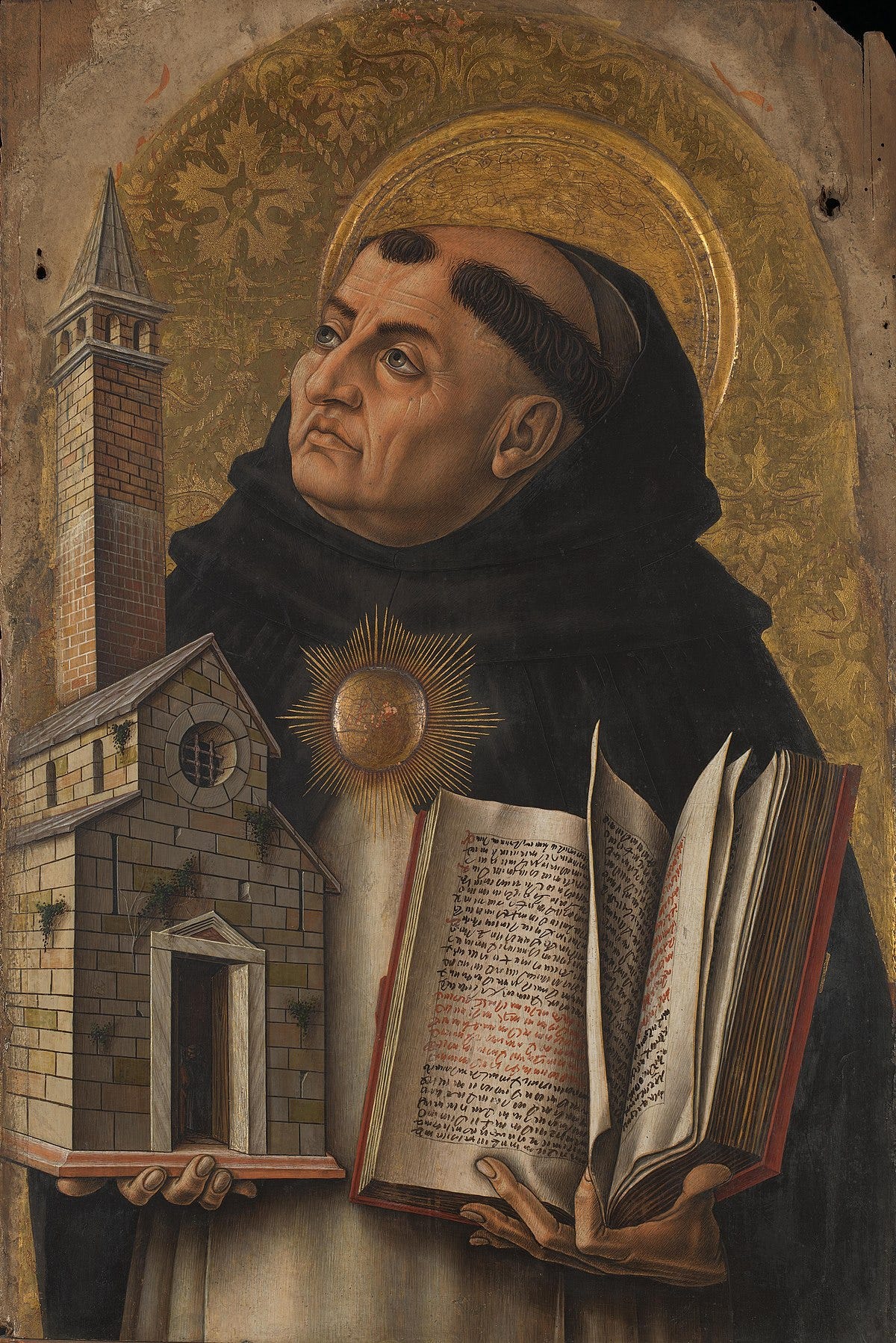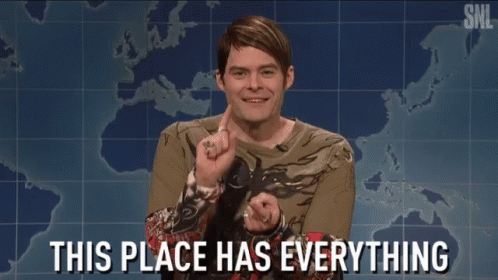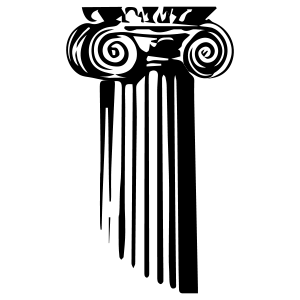Happy Friday friends,
And happy feast of the Angelic Doctor to all our Dominican friends. St. Thomas is, of course, one of the great minds of the Church.
The Thomistic Summa, or the odd rogue volume from it, is one of the truly indispensable pieces of Catholic interior decor. Though, in an illustration of the law of inverse relevance, usually the more prominently his work is displayed on a home’s book shelves, the less likely it is to have been read in the last decade. That’s certainly true in my own case.
Thomas is also rightly remembered as a great bulwark of Western thought, most famously working to salvage and reclaim the work of Aristotle, the classical Greek polymath, and preserve his place in the Christian world. It was no easy feat, I am sure. Selling the world of the merits of immanent realism would have been hard enough, even if Aristotle hadn’t insisted that women have fewer teeth than men.
Anyway, I consider it a great shame that his feast is not a solemnity, especially given that it falls on a Friday this year. It seems perverse to me that we have to fast while honoring a man so corpulent that they had to cut a section out of the refectory table to accommodate him.
But we do what we can, so find yourself a Dominican and treat them to a whole wheel of Stilton, or something.
Quick Links
As you might have read, at The Pillar or elsewhere, there are diocesan bishops in recent weeks who have begun prohibiting their priests from celebrating Mass in the ad orientem liturgical posture.
In terms of canon law and liturgical norms, this doesn’t have to do with the Extraordinary Form of the Mass, or the pope’s motu proprio Traditionis custodes — We are talking about a priest celebrating the Ordinary Form of the Mass, in English, facing East.
Amid that trend, there has been a lot of debate about liturgical posture, and what Vatican Council II did and didn’t say on the subject.
More than a few people have written to ask us if it’s possible, canonically speaking, for a bishop to ban a priest from saying Mass in the direction of his choosing. That is a very interesting question.
Actually, it’s one of many interesting questions about the whole topic of ad orientem and liturgical postures.
We’ve done our best to answer them for you.
We’ve put together a thorough, comprehensive, easy-to-understand explainer on what this whole ad orientem thing is all about.
—
You might have also noticed in recent weeks that a number of U.S. dioceses have begun issuing guidelines on the pastoral care of people who identify as LGBT.
Well, this week, The Pillar brings you our investigative reporting on a USCCB document which would be exactly that - a set of national principles from which pastors and bishops could have addressed difficult topics. Or it would have been exactly that, anyway.
A set of unpublished USCCB guidelines, titled “In the Image of God,” were drafted in 2018 — they address issues related to baptism, confirmation, receiving Holy Communion, and enrollment and employment at Catholic schools and in parish programs.
While stressing that Catholics “have the right” to clear and unambiguous catechesis, the text also underlines that the Church’s evangelical mission requires meaningful and respectful relationships.
But the guidelines have never been published.
Why not?
Well, the conference was all ready to go with the document. Twice. But it was spiked by the Congregation for the Doctrine of the Faith in Rome, who wanted to publish their own text first — we reported on that document last month.
It’s not clear why guidelines on this subject keep being written and then buried. But it seems clear that the pastoral needs they address aren’t going away, and, absent something better to work with, dioceses will continue to make their own policies piecemeal. It’s hard to see whose needs are being best served by this.
You can read the whole story, and the whole USCCB document, right here.
—
The effects of social atomization and isolation have been much discussed in recent years, and they have only got worse during the pandemic. Loneliness is shaping up into a full-blown spiritual and physical public health crisis.
In this week’s conversation with an interesting person, Charlie Camosy talked with behavioral scientist Susan Mettes, who has been looking at America’s burgeoning loneliness crisis and asking: what, if anything, can be done?
Camosy and Mettes come at loneliness from a number of interesting angles: the rise of social media, what healthy relationships look like in the first place, and the demographic trends:
“There is something going on with men and loneliness, even if it’s not that they’re a lonelier category. It is that they have a friendship crisis that is more dire than the friendship crisis among women.
Men have fewer friends than they used to and interact with the ones they have too little. And looking at what’s going on with younger men, we can expect more bad news on the loneliness front: rates of marriage and higher education are disproportionately down among men, and both marriage and higher education predict less loneliness.”
Disorder of Malta
If you have been checking in on our site regularly these last few weeks, you might be wondering what is going on with the Sovereign Military Order of Malta, and why we seem to care so much about it.
If we are talking about the law, that is kind of a big deal — the order’s representative called it “a direct attack” on the knights sovereignty. We don’t know, yet, how that standoff has resolved, but I expect we will by the end of the day, so stay tuned.
As for the reasons we think all of this is news? Well, we have been following this story for months, years really; it is developing by the day.
A 1,000 year old order of religious knights, international law, a diplomatic standoff with the Vatican, a global network of humanitarian relief projects, a constitutional crisis, and — of course — canon law? Who isn’t interested in that?
Of course, if you strip away all of the things which, I grant you, sound like a pitch for a Dan Brown novel, you are still left with a story that is really very important in the life of the Church.
For decades, the Order of Malta was been discussing its own future and trying to figure out how best to continue its work as the number of first class knights (the ones who make full religious vows of poverty, chastity, and obedience) declines.
How to provide for the running of a global institution that manages hospitals, educational programs, and even a small fleet of military (medical) helicopters, while keeping all these projects distinctly Catholic and expressive of the knights’ identity is a question which has faced many Catholic religious orders in recent decades.
In the United States, scores of hospitals, universities, and a host of other institutions were begun as apostolates of religious orders but have ended up continuing “in the Catholic tradition” in only the loosest sense, if at all.
Cool robes and diplomatic passports to one side — the issues they are facing have confronted other religious orders, and will confront more in the future. And that makes this worth paying close attention to - so stay tuned.
Very undignified indeed
Tuesday was the deadline set by judges for prosecutors in the Vatican financial trial to refile indictments against several of the defendants, or drop them.
Prosecutors had agreed in October to reopen their investigation into several of the charges facing six of the accused criminals, including Raffaele Mincione, the businessman who sold the Vatican that London building, and Pillar reader Cardinal Angelo Becciu.
Many, not least Mincione and Becciu’s lawyers, had been confidently predicting that the prosecutors would bottle it, dropping most of the charges against most of the accused, and signally the collapse of the trail.
Becciu himself wasn’t in court on Tuesday, where he would have heard a count of perverting the course of justice added back to his charge sheet to join indictments for embezzlement, abuse of office, and conspiracy.
The cardinal, who was sacked in disgrace by the pope in 2020 and made to resign his rights and privileges as a cardinal, had his lawyers present a letter to the court in which he insisted that the entire thing had become “harmful to his priestly dignity and offensive to the entire college of cardinals of which he is a member.” Which takes some nerve.
The substance of Becciu’s complaint is that during the interrogation of Becciu’s former deputy at the Secretariat of State, investigators discussed the cardinal’s litigiousness (he has sued Perlasca over his evidence and threatened to sue an Italian newspaper, and others, for libel over their reporting of his legal situation).
Why, the prosecutors asked Perlasca, hasn’t Becciu threatened to sue a well known comic, whose impressions of Becciu have become a staple on Italian TV, and who has more than once suggested he had an intimate relationship with his private spy, Cecilia Marogna — could there be some truth to his insinuations?
Perlasca had no idea, and said so. But Becciu’s legal team argue that the exchange introduces harmful rumors into the evidence, which prejudices all of Perlasca’s testimony. I find that funny, since it was Becciu’s lawyers who demanded that the full, unedited tapes of Perlasca’s depositions be included in the evidence in the first place.
As I noted last year, the entire reason the prosecution initially deposited edited versions of the Perlasca tapes was to exclude material unrelated to the charges and trial, material which could be argued to prejudice the case if they had sent it in. Now, having insisted on its inclusion, Becciu’s lawyers contend that it’s unfair, irrelevant and… prejudicial, and the whole case should be thrown out.
As pure legal strategy, it’s well played, but I doubt it will cut much ice with the judges.
In the meantime, Becciu may find that sending notes to the judges explaining that their little process is beneath his dignity, even as he’s become a late-night punchline, isn’t as strong a position as he thinks.
Catch up with everything here.
Winter Olympics
I have mixed feelings about the Summer Olympics, most because some of the sports seem to me to be silly, or repetitious.
I mean, does anyone care about rhythmic gymnastics? Really? And do we need all those races? Surely we just want to know who can run the fastest and furthest, who can jump the highest and longest, lift the most, and throw stuff the furthest.
I have, however, no such quibbles about the Winter Olympics, about which I am unironically and unabashedly enthusiastic. I don’t claim to have any particular affinity for any of the sports — or even to understand the rules for most of them. But as TV, it’s just a games of a higher order.
Instead of another tedious relay track race, we have speed-skaters hurtling around a rink, threatening to pile up like a stock car rally if someone so much as sneezes, and people literally launching themselves off the sides of mountains on skis.
I think what I love most about the winter Games is that so many of the “sports” seem like they probably originated as drunken dares (it’s one thing to put four guys in a bobsled, but there’s simply no sober explanation for skeleton).
Even better than the sports are some of the display events, which have been tried out at winter Games past but never made the cut. Like skijoring, which if you’ve never heard of it looks something like this:
Now think about the fussy show pony prancing they have in the summer Games and tell me what you’d rather watch.
See you next week,
Ed. Condon
Editor
The Pillar





